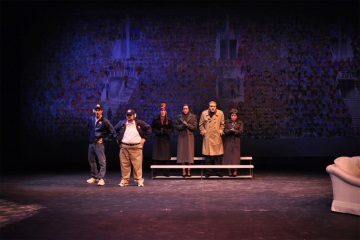It’s an unlikely friendship, the playwright and the football coach.
It’s an unlikely comparison, the sports of football and buzkashi.
In his play The Boy Inside, Richard Kalinoski explores themes of maturity, pain, risk, and growth through the prism of a Division III football program. Kalinoski is a professor of theatre at UW-Oshkosh as well as a fan of the Titans football program. His interactions and friendship with head coach Pat Cerroni and his staff helped inform the playwright’s research. He spent two years embedded with the Titans coaching staff, behind doors that usually remain closed. Cerroni also helped Kalinoski get in touch with several other small school coaches, including former UW-Whitewater coach Bob Berezowitz.
The play is set at fictional Ramsey College, which Kalinoski says he modeled somewhat on Linfield and St. Norbert. The football program at Ramsey is successful, but is threatened when a prominent donor makes a significant offer to the college, contingent upon the extermination of the football program. The play brings to center stage the philosophical conundrum facing football.
“I was always a football fan, but I made a lot of assumptions that I was happy to explode in my research,” said Kalinoski, who also directs the play. “I wanted to show why a coach might want to be a coach, knowing that he’s not going to become wealthy from it. The whole thing was very refreshing for me.”
The conversations with Cerroni and his staff began right around the time the Titans began their ascent to national prominence. The Titans entered this season with a 30-5 mark in WIAC play over the past five seasons. The run includes a national quarterfinal appearance last year and a national semifinal in 2012. Cerroni has lived the challenges faced by Ramsey coach Tony Bartolo in The Boy Inside.
“You have to have a common message. Getting a bunch of people to believe in one thing isn’t as easy as you think,” said Cerroni. “We really coach our senior classes on how to lead and we’re recruiting the right people. With all of that, you need the administration’s support behind you, giving you a chance to prove yourself.”
 The play explores the sometimes contentious relationships between football coaches and college administrators. In recent years, Cerroni has enjoyed the support of the UW-Oshkosh administrators. It wasn’t always as good as it is now. Coach Bartolo has to plead his case to his school’s college president when she fails to see the merits of college football the same as he does. She compares it to buzkashi, a brutal sport popular in Afghanistan in which players ride horseback and battle over a goat carcass at the center of the field. The physical toll of football is at the forefront of the play.
The play explores the sometimes contentious relationships between football coaches and college administrators. In recent years, Cerroni has enjoyed the support of the UW-Oshkosh administrators. It wasn’t always as good as it is now. Coach Bartolo has to plead his case to his school’s college president when she fails to see the merits of college football the same as he does. She compares it to buzkashi, a brutal sport popular in Afghanistan in which players ride horseback and battle over a goat carcass at the center of the field. The physical toll of football is at the forefront of the play.
“There is danger in football. The play doesn’t try to hide from that,” said Kalinoski. “I wanted the audience to understand that the danger of football is real.”
Cerroni has always tried to limit the risk of injury. The Titans do not tackle in practice. If any of them are going to suffer an injury, it’s likely going to occur on a Saturday.
“We haven’t been very physical in practice. You can’t afford to do it,” said Cerroni. “Injuries take their toll over time. Watching kids who work so hard see their career end in a second, that’s hard.”
It wasn’t just the physical toll of football that Kalinoski was interested in exploring. He wanted to get to know the players and why they play, in addition to understanding why coaches coach. He was surprised by what he discovered.
Written by Adam Turer, D3football.com • Photos courtesy of Richard Kalinoski
Learn more:

